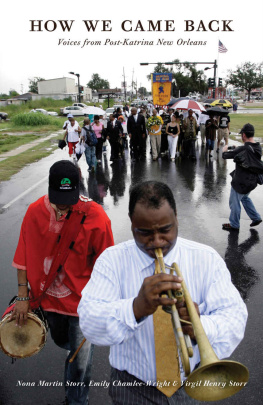Elise Blackwell
The Lower Quarter
For David,
who once observed
that all novels
are historical novels
Only part of us is sane: only part of us loves pleasure and the longer day of happiness, wants to live to our nineties and die in peace, in a house that we built, that shall shelter those who come after us. The other half of us is nearly mad. It prefers the disagreeable to the agreeable, loves pain and its darker night despair, and wants to die in a catastrophe that will set back life to its beginnings and leave nothing of our house save its blackened foundations. Our bright natures fight in us with this yeasty darkness, and neither part is commonly quite victorious, for we are divided against ourselves and will not let either part be destroyed.
rebecca west, Black Lamb and Grey Falcon
The human body was entering a machinery of power that explores it, breaks it down, and rearranges it.
michel foucault, Discipline and Punish
PART ONE. Inherent Vice Johanna
Taped into stiff brown paper, the small painting sat atop her feet, tilted against her shins a slight felt weight. Johanna worked the padlocks combination with the precise strength of someone who gardens or sews, though she practiced neither skill, and uncoiled the length of chain she had used five weeks earlier to secure her workshop doors handles. Lifting the painting to her hip with one arm, she pulled open the door with the other. The room released the dank smell of earth turned inside out, of something brought up that should have been left buried.
Water stains bloomed on the walls like flat moss, and moisture coated the floorboards, staining the wood darker. She inspected for pooled water and loose wires before touching the fuse box. The damage appeared to be two-dimensional not lethal, not here. She carried the painting upstairs to the spare living space squatting between her first-floor workshop and the buildings roof, laying the canvas flat on her table with the regard she gave to every painting under her care, this one no less.
Her first move was an act of optimism: Turn on the air conditioner. Next she hauled up from her van the suitcase of clothing and books, the boxes of food she had purchased ahead of her return, and one of the two HEPA filters that would clean the invisible dangers suspended in the air. She closed the door on her apartment at the top of the open staircase and brought the other filter into her street-level workshop. With a surgeons mask covering her nose and mouth, she set to returning her favorite room in the world to what it had been before the storm. The work she performed for others would be needed now more than ever, and she would be ready.
Though restoring surfaces injured by water was her expertise her vocation, she might even have said a room is not canvas and paint. The wood floors she would have to leave to chance. The companies that owned the specialized equipment capable of extracting water collected under floorboards would be booked for months, a year, longer, and at prices high enough to ensure that the very rich would be the first to recover.
Clay, she thought, but she would not ask him for help.
Eventually she would call him; perhaps she could wait until he tired of telling the story of how hed stayed in the city through the winds, through the flooding, as though the storm had come just for him. Even then, she would not ask for his help.
Johanna could not extract the water under her shops floorboards, but she at least knew better than to sand the floor as soon as its top dried a common mistake. She had no choice but to wait and see if her floor buckled. Either it would or it wouldnt, and she was a person who understood better than most what can and cannot be controlled in life, what is in a persons power to alter and what must be endured. A buckled floor is not such a bad thing. It wasnt as though she worked in the hermetic rooms she had trained in or a state-of-the-art restoration center. She imagined her bare feet comfortable on the warped wood, a smooth and eventually harmless surface.
Concentrating on the room above the floor, she worked across the warm morning to transform the space into a safe house for the paintings she would salvage. One of her early mentors had tried to lure her into preventive conservation, wanting to train her to help some off-top museum do no harm to the treasures it found under its watch. In the years during which she studied and still, really, among some circles stabilization was the shrine worshiped. Her teachers and most of her peers thought always of the Rembrandt that no one would dream of touching with a brush dipped in fresh paint. Preserve. Do no harm. Clean only when there is no risk. Leave the cracks be. An imperfect masterpiece is a masterpiece.
But Johanna had planned all along to work for herself, or, more accurately, never again to work for someone else. This meant moving in the world of lesser works, among people who treasured paintings unwanted by institutions good paintings and bad paintings but always paintings whose damage they wanted undone. At the least, they wanted harm hidden.
Circulation: first air, then light. Johanna removed her mask. Using the claw of a carpenters hammer, she removed the plywood she had secured over the windows facing Decatur Street and assessed the shattered rectangles. A loss easy to accept: two panes of twelve. The broken rectangles were small enough that she could leave the frame intact in the wall as she knocked loose glass, chiseled out the old putty and glazer points difficult work in cold weather but fairly easy in the still-warm early fall. She painted the wood with thick stripes of linseed oil, not minding the smell that many dislike: a spine-straightening sharpness wrapping the sweetness of decaying fruit.
The humidity outside was heavy enough to be visible; even the empty panes gave the effect of filmy glass. Looking across the vacant street was like looking through water, as though the Lower Quarter had indeed flooded and was aquarium still.
Or not a real place at all.
Lights blinked on, and the doors opened to the small restaurant and bar where Johanna had eaten her lunch nearly every day for three years. This could mean that her life would return to normal, to the normal it had become before chance had again dislocated her. Bad luck, but not so bad this time. She would walk over while the oil soaked in.
In the middle of the street she paused to look left, down Decatur toward the Marigny, and right, up Decatur toward the still-closed French Market on the river side of the street and Jackson Square on the other. With the exception of the evening she had driven out of the city, she had never seen the Lower Quarter so abandoned. The effect was the same as looking at an old black-and-white photograph, as though the colors she saw were superimposed, painted on years after the fact by a moderately skilled artist.
She wasnt the first customer back. Two others already sat at the counter. One she remembered: the lovely, buxom singer with a vodka-tonic habit and a litany of grievances that ranged from minute quotidian irritations to fifteen hundred dollars in unpaid parking tickets. Johanna could fit the woman into the history of the Quarter that she had learned and arranged in her mind. The other patron was a young man shed never seen before. He wore work boots and rested his wrist on a drab-green hard hat. Part of the new history, she supposed, jarred by the idea of change from without.
The bartender she knew as well as almost anyone in town, which made him an acquaintance: Peter.
Youre one of the first to swim home, he said.
Johanna nodded.
You think theyd at least clear my tickets, give those of us coming back a clean start, the singer was saying to the worker, whose face was turned away from Johanna as though this were a dream her mind had failed to populate fully. A world conjured by a tired god, or perhaps merely a lazy one.













